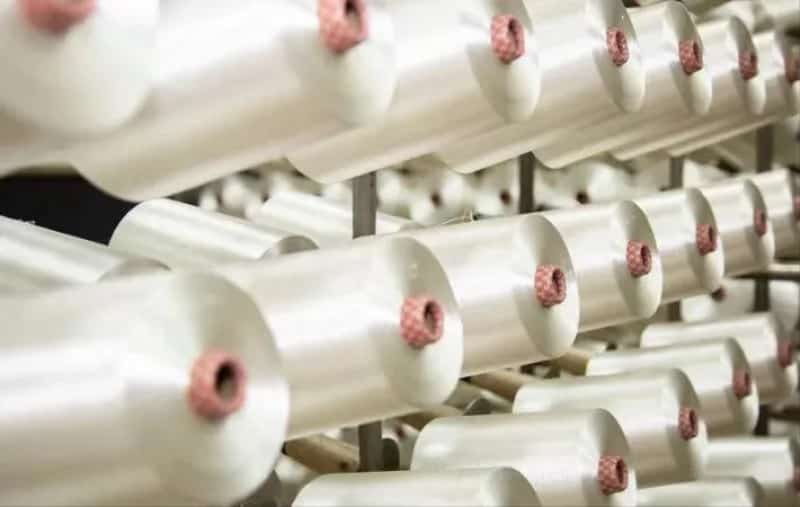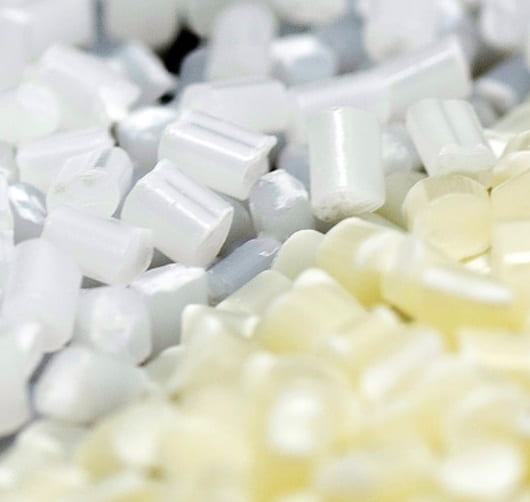Textile Recycling – From the Netherlands comes exciting news: BioBTX, a pioneering developer of renewable aromatics technology, has secured over €80 million to launch its first commercial-scale plant 05-06-2024
Textile Recycling
Crude Oil Prices Trend

Crude Oil Prices Trend by Polyestertime
Textile recycling plant acquired out of bankruptcy
The former Renewcell facility in Sweden is now operating as Circulose under new ownership.
Sweden-based investment firm Altor has acquired the assets of Renewcell, a Swedish cotton textiles recycling company that had declared bankruptcy last February.
“This acquisition marks a new chapter for Renewcell, now renamed Circulose,” states Renewcell on its website. “With Altor’s ownership, there is secure financing for the future of Circulose, ensuring that the company’s pioneering cotton recycling technology continues to thrive on a global scale.” Textile Recycling
“We extend our deepest gratitude to our customers, partners and stakeholders for their unwavering support and collaboration during this journey,” says Magnus Lundmark, CEO of Circulose.
“Together, we will continue to drive positive change, leveraging Altor’s expertise and resources to enhance our capabilities and secure a confident future for Circulose and the broader textile community,” adds Lundmark. Textile Recycling
A statement from Altor describes Renewcell as “a Swedish textile recycling company that was founded by innovators from Stockholm’s KTH Royal Institute of Technology in 2012.”

Freepoint Eco-Systems, a US-based recycler, is expanding its global footprint by establishing its first chemical recycling plant in Europe
The new facility, which will be located in Ghent, Belgium, is set to have an initial capacity of 80,000 tonnes/year for recycling plastic waste through pyrolysis. This venture is a collaboration with North Sea Port, where the plant will be constructed at the Kluizendok site. Textile Recycling
The project is not only a significant step for Freepoint but also a strategic move for the European waste management sector, offering a solution for recycling challenging plastic waste. The Ghent location was chosen for its strategic advantages, including superior logistics that align with Freepoint’s business model of creating large-scale circular economy infrastructure. In addition to the Ghent plant, Freepoint is actively developing other projects, including a 90,000 tonnes/year plant in Ohio, USA, set to commence operations this year, and a planned 180,000 tonnes/year facility in Eloy, Arizona.

Trinseo Launches Recycled-Containing Resins
Trinseo , a global leader in material solutions and manufacturer of plastics and latex binders, today announced the introduction of innovative recycled-containing acrylonitrile-butadiene-styrene (ABS) and styrene-acrylonitrile (SAN) resins. These new products, branded as MAGNUM™ ECO+, MAGNUM™ CR, and TYRIL™ CR, are set to revolutionize the automotive, industrial, and consumer goods sectors.
The MAGNUM™ ECO+ ABS resins, designed for the mobility industry, will debut at the 2024 Plastics in Automotive Engineering Conference in Mannheim, Germany. Utilizing post-consumer recycled (PCR) styrene from household waste, these resins support vibrant coloration through color concentrates and maintain the trusted performance of their fossil-based equivalents. Textile Recycling
MAGNUM™ CR and TYRIL™ CR grades cater to industrial and consumer goods, enhancing products like edge bands, coffee machine water tanks, and toothbrushes. Trinseo’s commitment to sustainability is evident in their portfolio, which includes the PULSE™ GX ECO PC/ABS and MAGNUM™ BIO ABS, and now expands with MAGNUM™ ECO+ ABS.
These sustainably advantaged resins incorporate up to 60% chemically recycled styrene, aligning with the ISCC+ Mass Balance principle. The innovative process ensures the recycled styrene is chemically identical to virgin styrene, eliminating the need for segregation during manufacturing. Textile Recycling
They promise a significant reduction in carbon footprint—up to 18%—compared to standard ABS and SAN grades, based on preliminary estimates from a cradle-to-gate study.

Reifenhäuser exhibits ‘fully recyclable’, 18-micrometre MDO-PE film
Reifenhäuser Blown Film is displaying the ‘world’s first’ 18-micrometre MDO-PE film at drupa 2024; it is said to reduce thickness by 25% compared to previous films and unlock the use of fully recyclable, low-carbon mono-material flexibles.
The solution is produced on Reifenhäuser’s EVO blown film lines using the patented EVO Ultra Stretch technology – this time combining it with suitable raw materials. The Ultra Stretch unit is positioned directly in the system’s haul-off, meaning the film is stretched from the first heat; this is believed to result in a stable, reliable process that can be reproduced over many hours. Textile Recycling
LG Chem and BOBST worked alongside Reifenhäuser to develop and test the film for practical suitability. Reportedly, it performs ‘excellently’ in the converting process.
It is said to adhere to the current market standard for stretched PE films, demonstrating a modulus of elasticity MD exceeding 1,400 MPa and a modulus of elasticity TD exceeding 1,100 MPa. Moreover, it claims to beat the market standard for optical properties, achieving a haze of less than 5% compared to a more widely-achieved 6-7%.
Reifenhäuser believes that, thanks to downgauging, manufacturers can now use the MDO-PE film to achieve fully recyclable packaging at a lower cost. Textile Recycling
Printed samples are being displayed at drupa, located in Hall 10 at Stand B30-1. MDO process and applications expert Mohamed Timol is acting as Reifenhäuser’s contact person at the stand

Floreon secures GBP 250 million to scale up bioplastics technology
The Centre for Process Innovation has invested half a million British pounds into the University of Sheffield spin-off
The Centre for Process Innovation (CPI), a UK-based tech and sustainable materials accelerator, has announced a GBP 250 million investment into the bioplastics developer Floreon, a spin-out technology from the University of Sheffield. Textile Recycling
Floreon makes proprietary compounds based on polylactic acid bioresin (PLA) containing 70% to 90% renewable, plant-based raw materials, including corn and sugar cane. The company says the materials are tougher than traditional PLA and can deliver significant energy savings in processing.
Floreon has also developed an alternative to flame retardant oil-based Acrylonitrile Butadiene Styrene (ABS). Its halogen-free bioplastic, the world’s first bioplastic to achieve UL94V-0 flammability certification, offers a safe and sustainable option for electrical goods. Derived from plants, it is suitable for chemical and mechanical recycling and has an up to seven times lower carbon footprint than oil-based plastic. Textile Recycling

From the Netherlands comes exciting news: BioBTX, a pioneering developer of renewable aromatics technology, has secured over €80 million to launch its first commercial-scale plant
This investment will fund the world’s first renewable chemicals plant utilizing BioBTX’s innovative ICCP Technology to produce sustainable aromatics — benzene, toluene and xylene — from plastic waste and biomass.
By converting plastic waste and biomass into renewable aromatics, BioBTX is spearheading the creation of a circular chemical industry, significantly reducing carbon emissions and reliance on fossil fuels. Aromatics, essential for producing every-day products like insulating foams, coatings, PET bottles, batteries, and pharmaceuticals, will now have a sustainable alternative to fossil-based sources, presenting a major opportunity for circular business models. Textile Recycling
The BioBTX backstory
The BioBTX project will be located at the PETRA Circular Chemicals Plant in Delfzijl. The PETRA plant will convert 20,000 tons of mixed plastic waste annually into renewable aromatics, replacing fossil resources and recycling low-value plastic waste into high-value chemicals.

Nippon Shokubai Indonesia Achieves ISCC PLUS Certification
PT. NIPPON SHOKUBAI INDONESIA (NSI), a subsidiary of NIPPON SHOKUBAI CO., LTD., headquartered in Osaka, Japan, has acquired ISCC PLUS certification for Acrylic Acid, Acrylates, and Superabsorbent Polymers. This certification establishes a global supply system in Belgium, Japan, and Indonesia, using biomass-derived raw materials allocated by the mass balance method. Textile Recycling
Acrylic acid and acrylates are used in paints and adhesives, while superabsorbent polymers are used in disposable diapers. The ISCC PLUS-certified products aim to reduce environmental impact and promote a circular economy. These products are also certified by the Indonesian Halal certification authority.
Halal certification is also expanding in regions with large Muslim populations. Nippon Shokubai Group will meet these demands globally by manufacturing and selling Halal-certified and biomass-derived products at NSI. The group aims for carbon neutrality by 2050, implementing its long-term vision and mid-term management plan to enhance customer value and realize a sustainable society. Textile Recycling
ISCC PLUS and Halal Certified Products
- Acrylic Acid
- Acrylates: Ethyl Acrylate, Butyl Acrylate, 2-Ethylhexyl Acrylate
- Superabsorbent Polymers: AQUALIC (TM) CA

Plastic sorting – Mura Inks Feedstock Partnership with Elite Recycling for Hydro-PRT Site 04-06-2024
Textile Recycling
